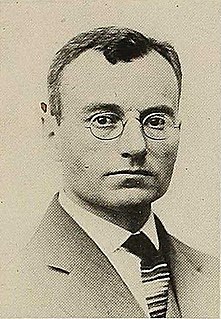A Quote by Marcus Vitruvius Pollio
In all matters but particularly in architecture, that which is signified is the subject of which we may be speaking and that which gives significance is a demonstration on scientific principles. One who professes himself an architect should be well versed in both directions.
Related Quotes
It is paltry philosophy if in the old-fashioned way one lays down rules and principles in total disregard of moral values . As soon as these appear one regards them as exceptions, which gives them a certain scientific status, and thus makes them into rules. Or again one may appeal to genius , which is above all rules; which amounts to admitting that rules are not only made for idiots , but are idiotic in themselves.
Everyone should do all in his power to collect and disseminate the truth, in the hope that it may find a place in history and descend to posterity. History is not the relation of campaigns and battles and generals or other individuals, but that which shows the principles for which the South contended and which justified her struggle for those principles.
Surely nowhere in the world do oppression and persecution based solely on the color of the skin appear more hateful and hideous than in the capital of the United States, because the chasm between the principles upon which this Government was founded, in which it still professes to believe, and those which are daily practiced under the protection of the flag, yawn so wide and deep.
It may be unpopular and out-of-date to say-but I do not think that a scientific result which gives us a better understanding of the world and makes it more harmonious in our eyes should be held in lower esteem than, say, an invention which reduces the cost of paving roads, or improves household plumbing.
I think men of science as well as other men need to learn from Christ, and I think Christians whose minds are scientific are bound to study science that their view of the glory of God may be as extensive as their being is capable. But I think that the results which each man arrives at in his attempts to harmonize his science with his Christianity ought not to be regarded as having any significance except to the man himself, and to him only for a time, and should not receive the stamp of a society.
It is contrary to the principles of reason and justice that any should be compelled to contribute to the maintenance of a church with which their consciences will not permit them to join, and from which they can derive no benefit; for remedy whereof, and that equal liberty as well religious as civil, may be universally extended to all the good people of this commonwealth.
It's not just that there is a cooperative spirit of investigation there, where we all recognise that we are engaged in a common project of inquiry. It's also that the philosophers are well-versed in the relevant empirical data, and the scientists are well-versed in the more abstract issues which are typically the central focus of philosophical work.
If I had to describe my remarks this evening frankly as if I were in police court and on oath, so to speak I should have to call it a ramble over several subjects, portions of which may seem to you to be impudent, and portions of which will be ignorant, and portions of which may contrive to be both at once.



































